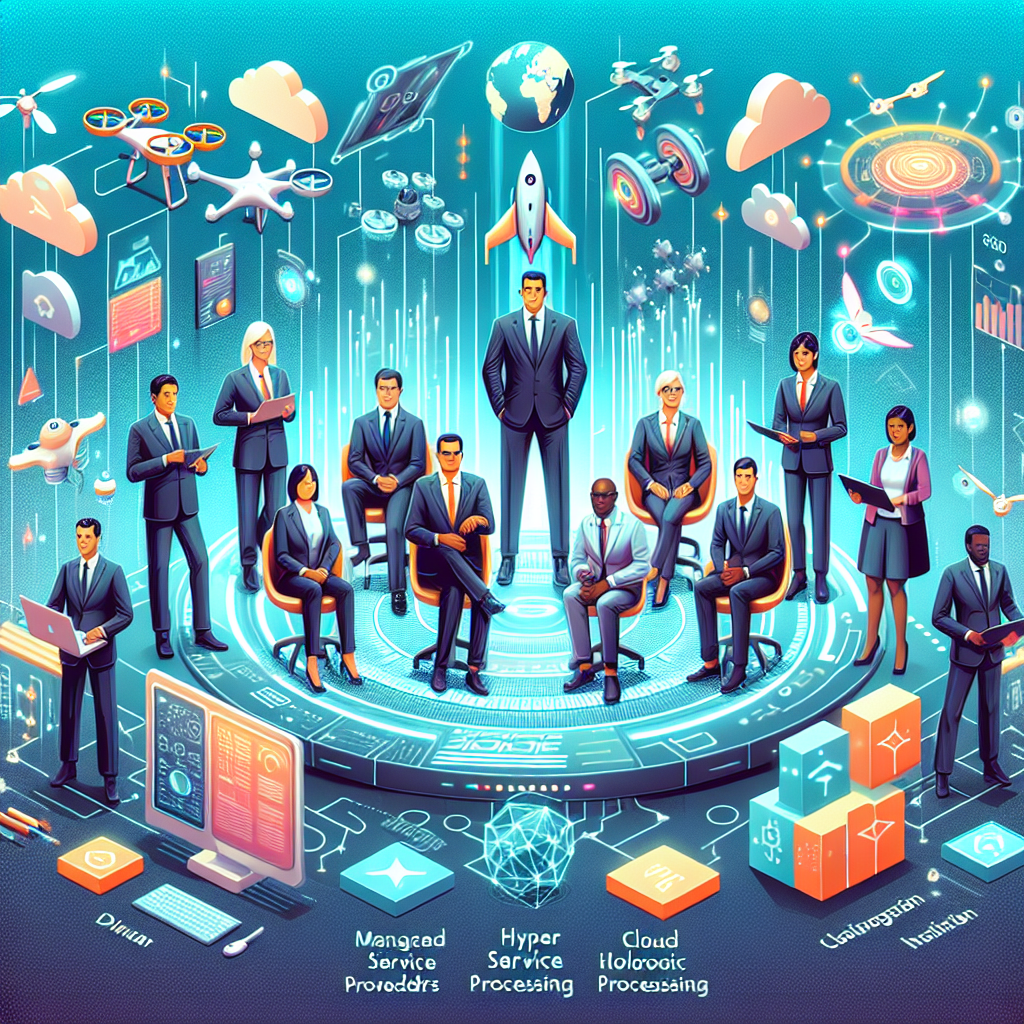Your cart is currently empty!
Tag: Industry

Trends and Innovations in the IT Outsourcing Industry
The IT outsourcing industry has seen significant growth and evolution in recent years, with new trends and innovations shaping the way businesses approach their technology needs. From cloud computing to artificial intelligence, companies are increasingly turning to outsourcing partners to help them stay competitive in the fast-paced digital landscape.One of the most prominent trends in the IT outsourcing industry is the rise of cloud computing services. As more businesses move their operations to the cloud, they are turning to outsourcing partners to help them manage and optimize their cloud infrastructure. This has led to a surge in demand for cloud experts who can help companies navigate the complexities of cloud migration and management.
Another key trend in the IT outsourcing industry is the increasing focus on cybersecurity. With cyber threats becoming more sophisticated and prevalent, businesses are looking for outsourcing partners who can help them protect their data and systems from potential breaches. This has led to a growing demand for cybersecurity experts who can offer services such as threat detection, incident response, and security audits.
Artificial intelligence (AI) is also playing a significant role in shaping the IT outsourcing industry. Businesses are increasingly turning to AI-powered solutions to automate repetitive tasks, improve decision-making processes, and enhance customer experiences. Outsourcing partners are leveraging AI technologies to offer services such as chatbots, predictive analytics, and machine learning, helping companies drive efficiency and innovation in their operations.
In addition to these trends, the IT outsourcing industry is also seeing innovations in areas such as blockchain, Internet of Things (IoT), and robotic process automation (RPA). These technologies are enabling businesses to streamline processes, improve productivity, and enhance customer engagement, leading to increased demand for outsourcing partners who can provide expertise in these areas.
Overall, the IT outsourcing industry is experiencing a period of rapid change and innovation, driven by the evolving needs of businesses in today’s digital economy. Companies that partner with outsourcing providers who can offer expertise in cloud computing, cybersecurity, AI, and other cutting-edge technologies will be well-positioned to thrive in the competitive marketplace. As the industry continues to evolve, businesses will need to stay ahead of the curve by embracing the latest trends and innovations in IT outsourcing.

Cloud Computing in the Healthcare Industry: Improving Patient Care and Efficiency
Cloud computing has revolutionized the way industries operate, and the healthcare sector is no exception. With the increasing demand for efficient and accessible healthcare services, cloud computing has emerged as a game-changer in the industry, improving patient care and efficiency.One of the key benefits of cloud computing in healthcare is the ability to store and access vast amounts of data securely and efficiently. Electronic health records (EHRs) can be stored in the cloud, allowing healthcare providers to access patient information from anywhere at any time. This not only improves communication and collaboration among healthcare professionals but also ensures that patients receive the best possible care.
In addition, cloud computing enables healthcare organizations to streamline their operations and reduce costs. By moving their IT infrastructure to the cloud, healthcare providers can eliminate the need for expensive hardware and software upgrades, as well as reduce the burden of managing and maintaining on-premises servers. This allows them to focus on delivering high-quality care to patients without being bogged down by technical issues.
Moreover, cloud computing in healthcare enables the integration of various systems and applications, leading to improved efficiency and productivity. For example, healthcare providers can use cloud-based telemedicine platforms to offer remote consultations and monitoring services, reducing the need for in-person visits and increasing access to care for patients in remote areas. This not only improves patient satisfaction but also helps healthcare organizations reach a larger audience and provide more personalized care.
Another significant advantage of cloud computing in healthcare is its scalability and flexibility. Healthcare providers can easily scale their IT infrastructure up or down based on their needs, allowing them to adapt to changing patient demands and market conditions. This ensures that healthcare organizations can remain agile and responsive to the evolving healthcare landscape, ultimately improving patient outcomes and satisfaction.
Overall, cloud computing has the potential to transform the healthcare industry by improving patient care and efficiency. By leveraging the power of the cloud, healthcare providers can enhance collaboration, streamline operations, and deliver high-quality care to patients, ultimately driving better health outcomes for individuals and communities. As the healthcare sector continues to evolve, it is clear that cloud computing will play a crucial role in shaping the future of healthcare delivery.

The Future of IT: How Managed Services are Shaping the Industry
In recent years, the world of IT has seen a significant shift towards managed services, and this trend is expected to continue shaping the industry in the future. Managed services involve outsourcing the management of an organization’s IT infrastructure to a third-party provider, allowing businesses to focus on their core operations while leaving the technical aspects to experts.One of the key reasons why managed services are gaining popularity is the increasing complexity of IT systems. With the rapid advancements in technology, managing an organization’s IT infrastructure has become a daunting task that requires a high level of expertise and constant monitoring. By outsourcing these responsibilities to a managed services provider, businesses can ensure that their systems are always up-to-date and secure, without having to invest in hiring and training in-house IT staff.
Managed services also offer cost savings for businesses, as they eliminate the need for expensive hardware and software investments. Instead, businesses pay a fixed monthly fee for the services they need, making it easier to budget and plan for IT expenses. Additionally, managed services providers often have access to the latest technologies and can help businesses stay ahead of the competition by implementing cutting-edge solutions that improve efficiency and productivity.
Another benefit of managed services is the increased focus on cybersecurity. With cyber threats becoming more sophisticated and prevalent, businesses are under constant pressure to protect their sensitive data and systems. Managed services providers have the expertise and resources to implement robust security measures, such as firewalls, antivirus software, and regular vulnerability assessments, to safeguard against cyber attacks and data breaches.
Looking ahead, the future of IT will undoubtedly be shaped by managed services. As businesses continue to rely on technology to drive growth and innovation, the demand for managed services will only increase. Managed services providers will play a crucial role in helping businesses adapt to new technologies, improve their operational efficiency, and enhance their cybersecurity defenses.
In conclusion, the future of IT is bright, thanks to the rise of managed services. By outsourcing their IT management to a trusted provider, businesses can focus on their core operations and stay ahead of the competition in a rapidly evolving digital landscape. Managed services are not only shaping the industry today but will continue to drive innovation and growth in the IT sector for years to come.

The Evolution of IT Outsourcing: Trends and Innovations Shaping the Industry
The Evolution of IT Outsourcing: Trends and Innovations Shaping the IndustryIn today’s fast-paced digital world, IT outsourcing has become an essential strategy for businesses looking to stay competitive and agile. Outsourcing IT services allows companies to access specialized skills, reduce costs, and focus on their core business functions. Over the years, the IT outsourcing industry has evolved significantly, driven by changing technology trends and innovations. Let’s explore some of the key trends and innovations shaping the IT outsourcing industry today.
1. Cloud Computing
One of the most significant trends in IT outsourcing is the adoption of cloud computing. Cloud services provide businesses with scalable and flexible solutions for storing data, running applications, and managing IT infrastructure. By outsourcing their IT services to cloud providers, companies can reduce costs, improve efficiency, and access the latest technology without having to invest in expensive hardware or software.
2. Artificial Intelligence and Machine Learning
Artificial intelligence (AI) and machine learning are revolutionizing the IT outsourcing industry. These technologies enable businesses to automate repetitive tasks, improve decision-making, and enhance customer experiences. By outsourcing AI and machine learning services, companies can leverage the expertise of specialized providers to develop innovative solutions that drive business growth and competitive advantage.
3. Cybersecurity
As cyber threats continue to evolve and become more sophisticated, cybersecurity has become a top priority for businesses of all sizes. Outsourcing cybersecurity services allows companies to access the expertise and resources needed to protect their data and systems from cyber attacks. By partnering with experienced cybersecurity providers, businesses can strengthen their security posture and mitigate the risks associated with cyber threats.
4. Agile and DevOps
Agile methodologies and DevOps practices have transformed the way IT projects are managed and delivered. By outsourcing IT services to agile and DevOps teams, companies can accelerate their software development cycles, improve collaboration between development and operations teams, and deliver high-quality products and services to market faster. Outsourcing agile and DevOps services enables businesses to stay ahead of the competition and respond quickly to changing market demands.
5. Internet of Things (IoT)
The Internet of Things (IoT) is reshaping the IT outsourcing industry by connecting devices, sensors, and systems to the internet, enabling data collection, analysis, and automation. By outsourcing IoT services, businesses can leverage the power of connected devices to improve operational efficiency, enhance customer experiences, and drive innovation. IoT outsourcing providers offer expertise in developing and managing IoT solutions that help businesses harness the full potential of this transformative technology.
In conclusion, the IT outsourcing industry is experiencing rapid evolution driven by technology trends and innovations such as cloud computing, artificial intelligence, cybersecurity, agile and DevOps, and the Internet of Things. By leveraging these trends and innovations, businesses can access specialized skills, reduce costs, and enhance their competitive advantage in today’s digital economy. As the IT outsourcing landscape continues to evolve, companies that embrace these trends and innovations will be well-positioned to succeed in an increasingly competitive and dynamic marketplace.

The Future of Maintenance: How Proactive Strategies are Revolutionizing the Industry
Maintenance has long been viewed as a reactive process – something that is done only when something breaks down or malfunctions. However, the future of maintenance is shifting towards a more proactive approach, where strategies are put in place to prevent breakdowns before they occur. This shift is revolutionizing the maintenance industry and changing the way companies approach equipment upkeep.Proactive maintenance strategies focus on identifying potential issues before they turn into major problems. This can involve regular inspections, predictive maintenance technology, and data analysis to predict when a piece of equipment is likely to fail. By taking a proactive approach, companies can minimize downtime, reduce repair costs, and increase the lifespan of their equipment.
One of the key technologies driving the shift towards proactive maintenance is the Internet of Things (IoT). IoT devices can be placed on equipment to monitor performance in real-time, providing data that can help predict when maintenance is needed. For example, sensors on a piece of machinery can detect changes in temperature or vibration that may indicate a problem. This data can then be analyzed to schedule maintenance before a breakdown occurs.
Another important aspect of proactive maintenance is the use of predictive analytics. By analyzing historical data and trends, companies can predict when equipment is likely to fail and schedule maintenance accordingly. This can help companies avoid costly breakdowns and keep operations running smoothly.
Overall, proactive maintenance strategies are revolutionizing the maintenance industry by shifting the focus from reactive to preventative. By implementing proactive maintenance measures, companies can save time and money, increase productivity, and improve equipment reliability. As technology continues to advance, we can expect to see even more innovative strategies emerge that will further transform the way maintenance is done. The future of maintenance is proactive, and companies that embrace this shift will reap the benefits of a more efficient and reliable operation.

The Importance of Customer Service in the Help Desk Industry
Customer service is a crucial aspect of the help desk industry, as it plays a significant role in building and maintaining customer relationships. In today’s competitive business landscape, businesses are constantly striving to provide exceptional customer service to set themselves apart from their competitors. This is especially true in the help desk industry, where customers often require assistance with technical issues and rely on prompt and effective support.The importance of customer service in the help desk industry cannot be overstated. When customers reach out to a help desk for assistance, they are often in need of urgent help to resolve a problem or issue. In such situations, it is essential for help desk agents to provide timely and effective support to ensure customer satisfaction. By delivering exceptional customer service, help desk agents can help build trust and loyalty with customers, which can lead to repeat business and positive word-of-mouth referrals.
One of the key benefits of providing excellent customer service in the help desk industry is the ability to enhance the overall customer experience. By ensuring that customers receive prompt and effective support, help desk agents can help customers resolve their issues quickly and efficiently. This can result in increased customer satisfaction and a positive perception of the company’s brand.
Moreover, effective customer service in the help desk industry can also help businesses identify and address customer issues proactively. By listening to customer feedback and addressing their concerns promptly, businesses can improve their products and services, leading to increased customer satisfaction and loyalty. Additionally, by providing exceptional customer service, businesses can also reduce the likelihood of customer complaints and negative reviews, which can impact their reputation and bottom line.
In conclusion, the importance of customer service in the help desk industry cannot be understated. By providing exceptional customer service, businesses can build trust and loyalty with customers, enhance the overall customer experience, and improve their products and services. Ultimately, delivering excellent customer service in the help desk industry can help businesses stand out from their competitors and create long-lasting relationships with their customers.

The Future of IT Outsourcing: How Technology is Shaping the Industry
The IT outsourcing industry has seen significant growth in recent years, driven by advancements in technology and the increasing need for businesses to stay competitive in the digital age. As technology continues to evolve, the future of IT outsourcing is being shaped in new and exciting ways.One of the key trends shaping the future of IT outsourcing is the rise of artificial intelligence (AI) and automation. AI and automation technologies are increasingly being used to streamline IT processes, improve efficiency, and reduce costs. This has led to a shift in the types of services that are being outsourced, with a greater emphasis on tasks that can be automated or handled by AI algorithms.
Cloud computing is another technology that is transforming the IT outsourcing industry. Cloud computing allows businesses to access IT resources and services on-demand, without the need to invest in expensive infrastructure. This has made it easier for companies to outsource their IT needs to third-party providers, who can deliver services over the cloud with greater flexibility and scalability.
Another trend shaping the future of IT outsourcing is the growth of cybersecurity services. With cyber threats becoming more sophisticated and prevalent, businesses are increasingly turning to outsourcing providers to help them protect their IT systems and data. This has led to a rise in demand for cybersecurity services, with outsourcing providers offering a range of solutions to help businesses stay secure in the digital age.
The future of IT outsourcing is also being shaped by the increasing focus on data analytics and business intelligence. Businesses are looking to harness the power of data to gain insights into their operations, improve decision-making, and drive innovation. Outsourcing providers are increasingly offering data analytics and business intelligence services to help businesses make sense of their data and unlock its full potential.
Overall, the future of IT outsourcing is bright, with technology playing a key role in shaping the industry. As businesses continue to embrace new technologies and look for ways to stay competitive in the digital age, the demand for IT outsourcing services is expected to grow. By leveraging advancements in AI, automation, cloud computing, cybersecurity, and data analytics, outsourcing providers can help businesses drive innovation, improve efficiency, and achieve their digital transformation goals.

The Future of IT Management: How MSPs are Reshaping the Industry
The IT industry is constantly evolving, and with the rapid advancements in technology, the role of IT management is also changing. Managed Service Providers (MSPs) are playing a crucial role in reshaping the industry by offering a more efficient and cost-effective solution for businesses of all sizes.MSPs provide businesses with a range of IT services, including network management, data backup and recovery, cybersecurity, and cloud computing. By outsourcing these services to MSPs, businesses can benefit from expert IT support without the need to hire a full-time IT staff. This not only saves businesses time and money, but also allows them to focus on their core competencies.
One of the key ways in which MSPs are reshaping the industry is through their ability to provide proactive IT management. Rather than waiting for something to go wrong and then fixing it, MSPs use monitoring and management tools to prevent issues from occurring in the first place. This proactive approach helps to minimize downtime and keep businesses running smoothly.
Another way in which MSPs are reshaping the industry is through their focus on cybersecurity. With the increasing number of cyber threats facing businesses today, it is more important than ever for companies to have robust cybersecurity measures in place. MSPs can help businesses to implement security measures such as firewalls, antivirus software, and intrusion detection systems to protect their data and systems from cyber attacks.
Additionally, MSPs are also helping businesses to transition to the cloud. Cloud computing offers a range of benefits, including increased flexibility, scalability, and cost savings. MSPs can help businesses to migrate their data and applications to the cloud, as well as provide ongoing support and management of their cloud infrastructure.
Overall, the future of IT management is being reshaped by MSPs who are offering businesses a more efficient and cost-effective solution for their IT needs. By outsourcing IT services to MSPs, businesses can benefit from expert support, proactive management, and enhanced cybersecurity measures. As technology continues to evolve, MSPs will play an increasingly important role in helping businesses to stay ahead of the curve and adapt to the changing IT landscape.
Billionaire Philippe Laffont Just Sold Top Artificial Intelligence Stocks Nvidia and AMD and Piled Into 2 Players Dominating Another High-Growth Billion-Dollar Industry
As founder of Coatue Management, Philippe Laffont oversees $26.9 billion invested in more than 80 stocks, and though he buys players across many sectors, one in particular stands out. The billionaire is known for his investments in innovative companies, and he’s generally found them in the area of technology. The sector consistently represented more than 40% of his holdings over the past five quarters, and four of his five most heavily weighted stocks — led by Meta Platforms and Amazon — are giants in the tech field.
But in the third quarter, Laffont and his team cut their positions in two of the world’s most-watched tech stocks right now and increased positions in two stocks in a completely different high-growth area that’s generating billions of dollars these days. Laffont reduced artificial intelligence (AI) chip giants Nvidia (NVDA -3.67%) and Advanced Micro Devices (AMD -2.45%), companies that have been growing data center sales in the triple digits, and increased investment in two companies dominating a market that may reach beyond $100 billion later this decade. Let’s find out more.

Image source: Getty Images.
Laffont’s Nvidia and AMD holdings
So, first let’s talk about Laffont’s Nvidia and AMD holdings. He hasn’t exactly dropped them like a hot potato and still clearly believes in these companies’ futures. Nvidia is the leading AI chip designer, with more than 70% market share, and offers customers an entire portfolio of related products and services. This has helped the company generate record revenue in recent times — and the stock has followed, climbing 171% last year.
AMD may be a far-behind rival to Nvidia in the AI chip market, with about 11% share, but the company still has delivered significant growth thanks to demand from AI customers. In the recent quarter, AMD reported a 122% increase in data center revenue to $3.5 billion and said it’s on track to report record full-year revenue.
Laffont reduced his position in Nvidia by 26% in the quarter and now owns 10,138,161 shares, and he cut his AMD holding by 32% to 4,249,190 shares. So, Laffont is still betting on gains in these stocks, but he’s also turning to another area to benefit from innovation.
In the quarter, Laffont boosted his holdings of Eli Lilly (LLY -1.48%) and Novo Nordisk (NVO -1.04%), two companies that are dominating the weight loss drug market. Analysts expect this market to reach $100 billion to $130 billion by 2030, so this could represent significant opportunity for these drugmakers and those who invest in them.
Looking for innovation beyond the tech industry
Laffont increased his position in Lilly by more than 19% and now holds 247,950 shares, and he lifted his position in Novo Nordisk by more than 800% and now owns 326,363 shares. Of course, these pharma players still represent a much smaller portion of Laffont’s portfolio than AI stocks, but his move shows he’s on the lookout for innovation and growth opportunities — and can find them — well beyond the tech industry.
Lilly and Novo Nordisk both have demonstrated they could be the right stocks to add growth to a portfolio now and into the coming years. Lilly is the seller of Mounjaro and Zepbound, while Novo Nordisk sells Ozempic and Wegovy — names many of us have heard in the news due to high demand for these products. They act on hormone pathways involved in the management of blood sugar levels and appetite, and as a result, they’ve delivered great results to patients aiming to lose weight. (Mounjaro and Ozempic are approved for type 2 diabetes, but doctors have prescribed them off-label for weight loss. Zepbound and Wegovy are specifically approved for weight control.)
These drugs have generated blockbuster revenue, and considering the level of demand and forecasts for market growth, this is likely to continue. On top of this, Lilly recently won approval for Zepbound in another indication — sleep apnea — opening the door to Medicare coverage. And Medicare covers Wegovy as a treatment to reduce heart attack or stroke risk. This is important because it increases the number of patients who can afford these drugs. (Medicare won’t reimburse drugs approved for weight loss alone.)
All of this means buying shares of these two big pharma players right now may have been a genius move by Laffont — and other investors looking for growth might want to do the same.
Randi Zuckerberg, a former director of market development and spokeswoman for Facebook and sister to Meta Platforms CEO Mark Zuckerberg, is a member of The Motley Fool’s board of directors. John Mackey, former CEO of Whole Foods Market, an Amazon subsidiary, is a member of The Motley Fool’s board of directors. Adria Cimino has positions in Amazon. The Motley Fool has positions in and recommends Advanced Micro Devices, Amazon, Meta Platforms, and Nvidia. The Motley Fool recommends Novo Nordisk. The Motley Fool has a disclosure policy.
In a surprising move, billionaire investor Philippe Laffont has recently sold off top artificial intelligence stocks Nvidia and AMD, and instead, has shifted his focus towards two players dominating another high-growth billion-dollar industry.Laffont, who is known for his successful investments in technology and growth stocks, has decided to reallocate his capital into companies that are leading the way in a different sector. While the sale of Nvidia and AMD may come as a shock to some, Laffont is confident in his decision to move towards companies that are poised for significant growth in the coming years.
The two players that Laffont has now invested in are at the forefront of a booming industry that is set to revolutionize the way we live and work. With their innovative products and services, these companies have the potential to dominate their respective markets and generate massive returns for investors.
While Laffont’s decision to sell off Nvidia and AMD may raise eyebrows, it is clear that he sees a brighter future in the companies he has chosen to invest in. As the world continues to embrace new technologies and industries, it will be interesting to see how these investments play out in the long run.
Tags:
- Philippe Laffont
- Billionaire investor
- Artificial Intelligence stocks
- Nvidia
- AMD
- High-growth industry
- Billion-dollar industry
- Investment strategy
- Technology investments
- Stock market trends
#Billionaire #Philippe #Laffont #Sold #Top #Artificial #Intelligence #Stocks #Nvidia #AMD #Piled #Players #Dominating #HighGrowth #BillionDollar #Industry

The Future of Managed Service Providers in the Technology Industry
Managed Service Providers (MSPs) have long been a crucial part of the technology industry, providing businesses with a range of services to help them manage and optimize their IT infrastructure. As technology continues to evolve at a rapid pace, the role of MSPs is also changing, and they are poised to play an even more important role in the future of the industry.One of the key trends shaping the future of MSPs is the increasing complexity and diversity of IT environments. With the rise of cloud computing, mobile devices, and the Internet of Things (IoT), businesses are faced with a multitude of technologies and systems that need to be managed and integrated. MSPs are well-positioned to help businesses navigate this complexity by providing expertise in a wide range of technologies and offering tailored solutions to meet their specific needs.
Another important trend is the growing emphasis on cybersecurity. As cyber threats become more sophisticated and prevalent, businesses are increasingly turning to MSPs to help them protect their data and systems from attacks. MSPs are investing in advanced security solutions and expertise to help their clients stay ahead of cyber threats and ensure the security of their IT infrastructure.
Additionally, the rise of artificial intelligence (AI) and automation is changing the way MSPs deliver their services. AI-powered tools can help MSPs monitor and manage IT systems more efficiently, identify potential issues before they arise, and automate routine tasks, allowing them to focus on more strategic initiatives. This can result in improved service levels and cost savings for businesses.
Furthermore, the shift towards a more remote and decentralized workforce is driving the need for MSPs to provide flexible and scalable solutions that can support employees working from anywhere. MSPs are offering cloud-based services, virtual desktop infrastructure, and collaboration tools to help businesses enable remote work and ensure productivity and connectivity for their employees.
In conclusion, the future of Managed Service Providers in the technology industry looks promising, with MSPs playing a vital role in helping businesses navigate the complexities of modern IT environments, protect against cyber threats, leverage AI and automation, and support remote workforces. By staying ahead of emerging technologies and trends, MSPs can continue to provide value to their clients and drive innovation in the industry. Businesses that partner with MSPs can benefit from their expertise, resources, and flexibility to adapt to the ever-changing technology landscape and achieve their business goals.
